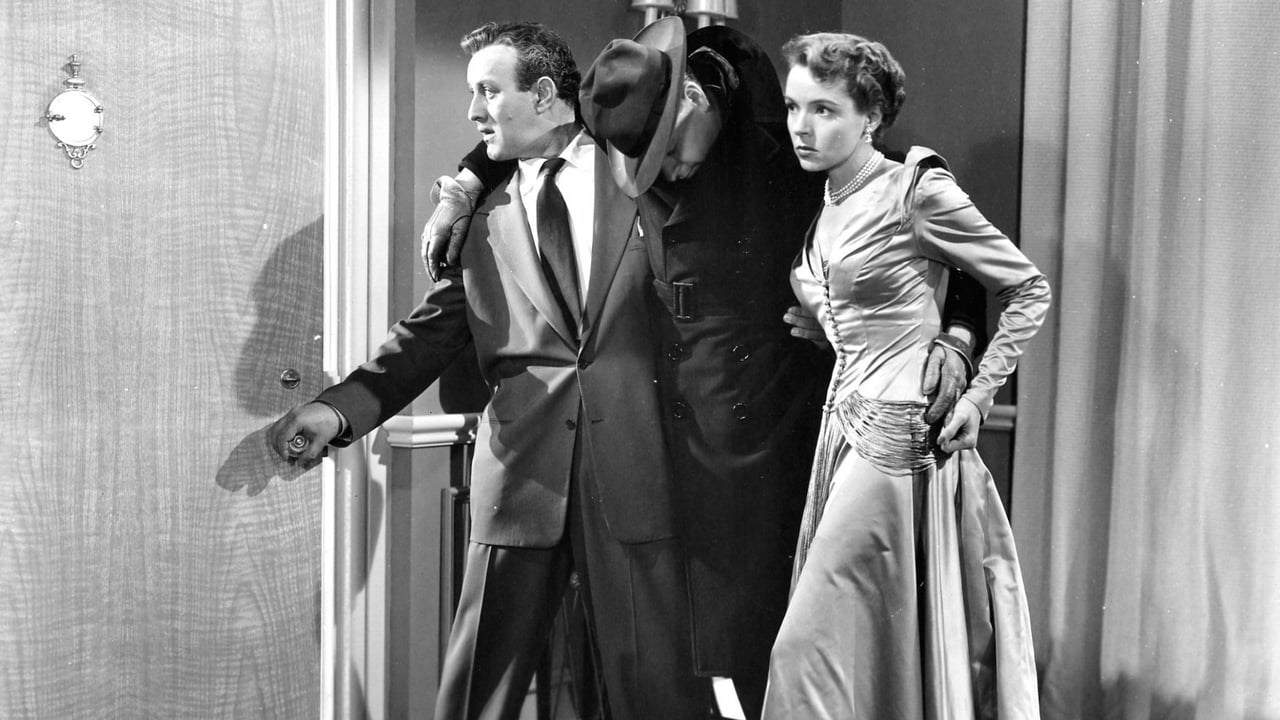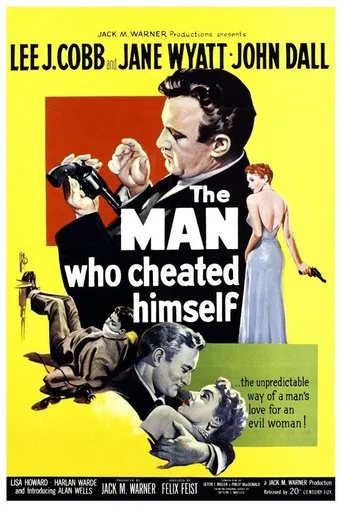

I gave this film a 9 out of 10, because it was exactly what I expected it to be.
... View MoreIt’s fine. It's literally the definition of a fine movie. You’ve seen it before, you know every beat and outcome before the characters even do. Only question is how much escapism you’re looking for.
... View MoreNot sure how, but this is easily one of the best movies all summer. Multiple levels of funny, never takes itself seriously, super colorful, and creative.
... View MoreA film of deceptively outspoken contemporary relevance, this is cinema at its most alert, alarming and alive.
... View MoreA restrained Lee J. Cobb stars in this noir where he plays a cop protecting the woman he's having an affair with after she kills her estranged husband. Cobb's brother, who has been promoted to detective, keeps questioning the clues & suspects as Cobb tries to overlook them w/disastrous results. Nicely shot in San Francisco, this may not be the best noir made but it'll do.
... View MoreA superb noir thriller. Lee J. Cobb and John Dall square off as brothers and fellow policemen in this breathlessly paced, well-written and well-acted film. Normally I can't stand Dall's jack-o-lantern grin, but it's bearable here as part of his counterpoint to Cobb's brute intensity. The two women are as different as the men; Dall's Lisa Howard is sweetness and sunshine, Jane Wyatt's Lois a selfish, manipulative schemer.It's ironic that Dall's Andy, the younger, and presumably naive brother, has by far the better private and public life. Cobb's character, on the other hand, junks everything to cover up for Lois's murder of her husband. She's frantic and seemingly delusional in her first scene with Cobb. Even though she's right that her husband intends to kill her, she immediately declaims responsibility for killing him. As Cobb chooses to play a double game 'investigating' the murder, we sense the tension he undergoes, as well as his brother's growing skepticism.The young guy who Cobb tries to frame for the murder convincingly portrays a somewhat stereotypical down-on-his-luck type. He's also complicates the plot, as he has committed a murder, just not the one in question. So, in the middle of the movie, Cobb looks like he just might get out from under the murder after all. Cobb's menacing demeanor, which winds up tighter as the plot ensnares him, makes us forget that he's an accomplice, not the actual murderer.The last scene at Fort Point is great. Claustrophobic and desolate, it captures hauntingly the iconic noir atmosphere. The corridors and passageways lead Cobb and Wyatt ultimately into handcuffs. The title points in a few directions: Cobb has cheated himself by going along with the cover-up, he's also the man whose lover 'cheats' her husband for. The only quibble with The Man Who Cheated Himself involves disposing of the husband's body. It is a nice recycling of the husband's alibi to use the airport, but who would be dumb enough to drop a body in plain view of witnesses? Especially if you're a detective. Use the Bay, so the body can 'sleep with the fishes.' Anyway, if you can stand this miscue, along with John Dall's rubber-band grin, this is a fine noir movie.
... View MoreThis is another of the many B minus movies tagged as film noir in the hope of generating some interest in something that is devoid of it. All aspects of the film - script, acting, direction - are mediocre. The acting by the three leads is wooden. I guess John Dall was expected to go places in the movie business but then someone realised he had little talent and therefore ended up doing TV work. Lee J Cobb who is usually terrific cannot rise above the poor script and poor direction. Jane Wyatt is supposed to be a femme fatale but comes nowhere near convincing the viewers. The movie does have two of the strangest looking cars that I have ever seen, the one in which John Dall goes after Lee J Cobb is particularly strange. The DVD transfer is typical Alpha.
... View MoreA homicide lieutenant, Lee J. Cobb, has a rich girl friend, Jane Wyatt, who is about to divorce her husband. The husband has been planning to kill her and make it look like a burglary gone wrong. Cobb stumbles into their sitting room just as Wyatt and her husband are struggling for the gun. Hubby winds up shot twice and dead. Instead of reporting the incident to the police, Cobb disposes of the body elsewhere and throws the gun off the Golden Gate Bridge.He's assigned to the case, however, and is to be assisted by his younger brother, John Dall, a rookie sergeant. All kinds of twists and turns follow. The gun thrown from the bridge evidently landed in the net of a fishing boat instead of the sea. And another gun is used in a robbery that is microscopically identical to the gun in Cobb's case. A witness to Cobb's disposal of the body turns out to have been color blind and made a mistake concerning the color of the coupe Cobb was driving.John Dall finally twigs. Cobb cold cocks him and he and Wyatt leave for a temporary hiding place at Fort Point, but Dall discovers them and they are arrested. Final scene: A charming Wyatt is cuddling her lawyer in the courthouse, saying, "Oh, you'll get me out of this, won't you? I have lots of money." After a contemptuous stare, she passes the handcuffed Cobb without a word.It's a workably formulaic plot -- investigating yourself, or having your brother investigate you. "The Big Clock" probably did a better job of it. More recently it was borrowed for "Presumed Innocent." I don't know how many other examples have been floating around.This exemplar is pretty humdrum. Lee J. Cobb is a magnificent actor and has done fine work elsewhere, especially for Elia Kazan. Here, he's dour throughout. Even at the beginning, when he's supposed to be joking with his newly arrived kid brother about the kid's forthcoming marriage, he seems to be performing a duty instead of enjoying himself. Nor is this Jane Wyatt's kind of role -- the treacherous, perfidious rich dame. She was attractive and perceptive and sensible. Here, the director (Felix Feist) has her overacting to the point of dolor. (She faints twice in the same scene after some hysterical babbling.) Dall doesn't add much but he's given at least a more complex role.The story itself doesn't make a heck of a lot of sense. After all, Jane Wyman had been whining abjectly about her husband's plans to murder her -- and she was RIGHT. Hubby had jimmied the door, bought a gun, and did what he could to arrange a fake burglary and was caught and killed just in time to prevent him from achieving his goal. So why does an experienced policeman like Cobb, without a moment's reflection, decide to cover up the death? How can two guns have identical lans and grooves? And what is the likelihood of their BOTH being used in murders within a few days of each other? I'll tell you what the likelihood of that's happening is. The probability is exactly .00012848329.Come to think of it, I'm not sure about how one of those guns wound up in Tito Vuolo's fishing net. Was it the gun that Cobb threw from the bridge? Or did the gun belong to Vuolo's ne'er-do-well son? And, if I remember, blue-green color blindness is less common than red-green. Not that it makes much difference in everyday life. I mean, when was the last time anything important depended on your distinguishing blue from green? The Samoan language has only one word for the part of the color spectrum that includes both blue and green and the Samoan people are doing quite well, thank you very much.I've kind of made fun of an unambitious B feature, I know, and maybe I shouldn't, but it really is a little dull and sometimes jarringly discordant.
... View More